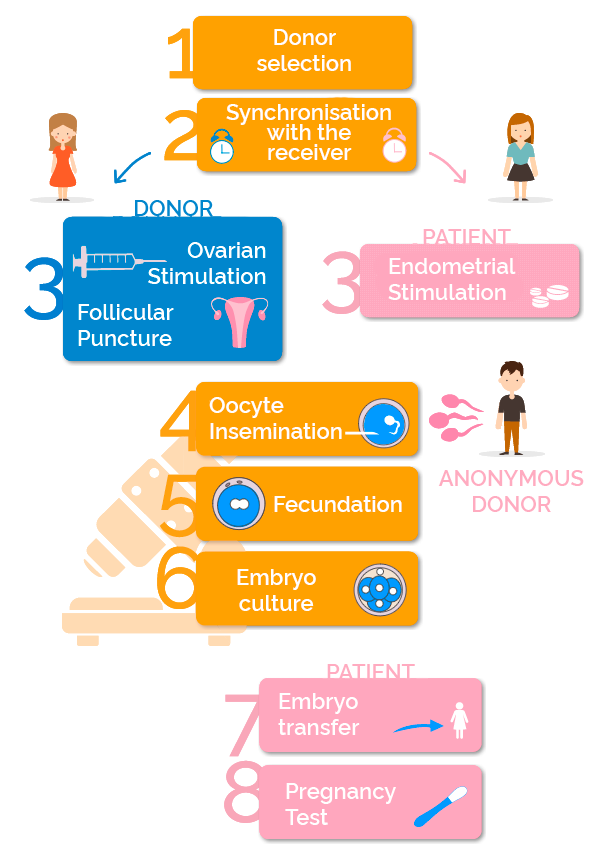Ovodonation with donor sperm

Egg donation with sperm from a donor is a technique whereby a healthy young woman decides to donate her eggs, anonymously and altruistically, to assisted reproduction centers so that they can be used by other women or couples who have female fertility problems.
These donated eggs are fertilized in the laboratory by the sperm of a carefully selected anonymous donor. The correctly fertilized ones are monitored for several days until the best quality embryos are transferred to the maternal uterus. It is the most effective assisted reproduction technique, thanks to its high pregnancy rates.
What does egg donation with donor sperm consist of?

For whom is this technique indicated?
Egg donation with donor semen is indicated for:
- Couples where the man has severe male factor infertility, with poor sperm quality or azoospermia.
- Couples where the man is the carrier of a genetic disease that cannot be diagnosed by PGD.
- Couples where the woman suffers from ovarian failure due to menopause, premature ovarian failure or ovarian surgery.
- Couples where the woman is elderly.
- Couples where the woman cannot use her own oocytes, because of their poor quality.
- Couples where the woman has experienced repeated implantation failures in In Vitro Fertilisation treatments.
- Couples where the woman has undergone surgery, chemotherapy and radiotherapy treatments.
- Couples where the woman has chromosomal alterations and serious hereditary diseases that cannot be detected by PGD techniques.
- Couples who have suffered recurrent miscarriages.
- Couples who have failed other previous assisted reproduction techniques.
- Women without a male partner who want to get pregnant and be single mothers.
- Couples of homosexual women.
At VITA we have a team of specialists in charge of carrying out the selection process of oocyte donors and their subsequent coordination with the recipient patients.
Where do egg donors come from?
According to the Spanish legislation on donations, egg donors must meet some requirements. They must be between the ages of 18 and 35, in good mental and physical health, and free of any genetic or sexually transmitted disease.
The donors are young women who freely decide to carry out an altruistic and anonymous act of solidarity to help other women fulfill their dream of becoming mothers. All donors go through a “Donor Screening“, a rigorous medical and psychological examination to guarantee the highest quality and safety in the treatments.
Donors undergo a complete medical check-up where diseases, family history and personal habits are evaluated. A psychological test, a gynecological examination, an ultrasound scan and blood tests are carried out, as well as a genetic study of autosomal recessive diseases carriers.
If all the tests are satisfactory, the donor is included in our donor database until there is a possible recipient compatible with her phenotype (physical characteristics).
Where do sperm donors come from?
According to the Spanish legislation on donations, semen donors must meet some requirements. They must be between 18 and 35 years old, in good mental and physical health, have good semen quality and not suffer from any genetic or sexually transmitted disease.
VITA uses the CEIFER sperm donor bank, whose donors go through a strict and exhaustive examination in order to guarantee the quality of the treatments. The donor will undergo various tests and studies, such as a first medical evaluation, a psychological test, a study of the sperm quality, a genetic study and a study of infectious diseases, sexually transmitted diseases, etc.
All sperm donors go through the “Donor Screening“, a Study of Autosomal Recessive Genetic Diseases Carriers. Through this test it is possible to detect the most common autosomal recessive genetic diseases. In addition, when the time comes to assign the donor, a “Genetic Matching” protocol is followed, so that the donor and the patient do not share mutations in the same genes.

